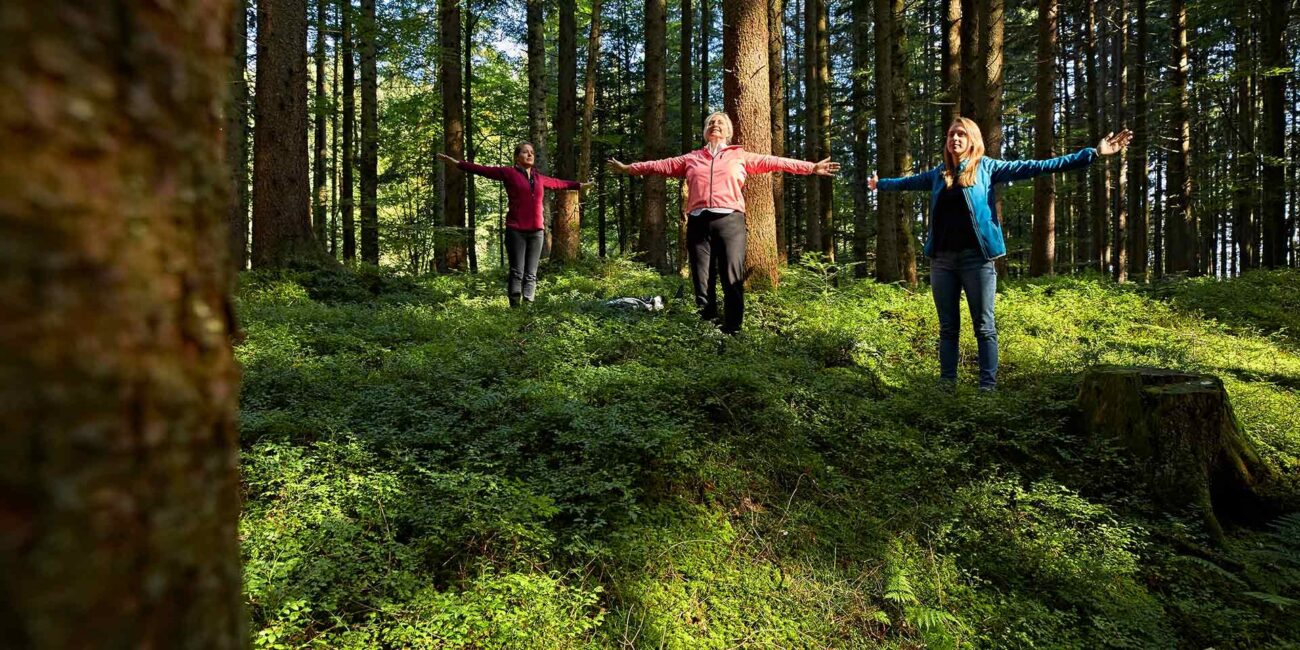Forest bathing, or shinrin-yoku, is a Japanese practice that improves health and well-being by spending time in natural settings.
What is Forest Bathing?
‘Forest Bathing’ or ‘Nature Therapy’ comes from the Japanese Shinrin Yoku. Translated literally, shinrin-yoku means “forest bathing.”
It was developed in Japan in the 1980s as a way to help stressed-out city dwellers unwind. The term describes the experience of mindfully taking in the forest atmosphere during a leisurely walk and has become an important cornerstone of preventative healthcare in Japan and the East.
In Europe and the USA, we might also know it as ecotherapy.
A forest bathing trip involves visiting a forest for relaxation and recreation while breathing in volatile substances, called phytoncides (wood essential oils), which are antimicrobial volatile organic compounds derived from trees, such as α-Pinene and limonene.
Incorporating forest bathing trips into a good lifestyle was first proposed in 1982 by the Forest Agency of Japan.

The practice involves slowing down, being present in the moment, and engaging with nature through the senses, like walking, meditating, or simply sitting and observing the natural surroundings.
Just 24 hours in the forest can bring a positive impact, resulting in better health and quality of life. This practice is now a recognized relaxation and/or stress management activity in Japan and is becoming popular around the world.
Health Benefits from Forest Bathing
With a set of balance and healthy habits, along with the practice of Shinrin-yoku, will help improve physical and mental health.
Several benefits for both physical and mental health using the forest bathing method include:
- Reduced stress: Studies have shown that forest bathing can reduce levels of the stress hormone cortisol and improve feelings of relaxation and well-being.
- Improved immune function: Exposure to natural elements such as trees and plants can improve immune function and increase the production of natural killer cells.
- Lower blood pressure and heart rate: Spending time in nature has been shown to lower blood pressure and heart rate, which can reduce the risk of cardiovascular disease.
- Improved mood and mental health: Forest bathing has been shown to improve mood, reduce symptoms of anxiety and depression, and increase feelings of happiness and well-being.
- Increased creativity and cognitive function: Spending time in nature has been linked to improved creativity, focus, and cognitive function.
Health Studies
Life in the forest developed hundreds of field studies and research with practice Shinrin Yoku providing a mutual experiment called “Eating alive Forest.” The evidence and scientific studies that are being applied have been developed in children and their relationship with Shinrin-yoku.
Check out this study presented by Pub Med here.
A 2010 research review found that forest environments promoted lower concentrations of cortisol, lower pulse rate, lower blood pressure, greater parasympathetic nerve activity, and lower sympathetic nerve activity than city environments.
Overall, forest environments have been found to be advantageous with respect to acute emotions, especially among those experiencing chronic stress, and is a simple yet effective way to improve health and well-being.
Get the news you need at It’s On News.


